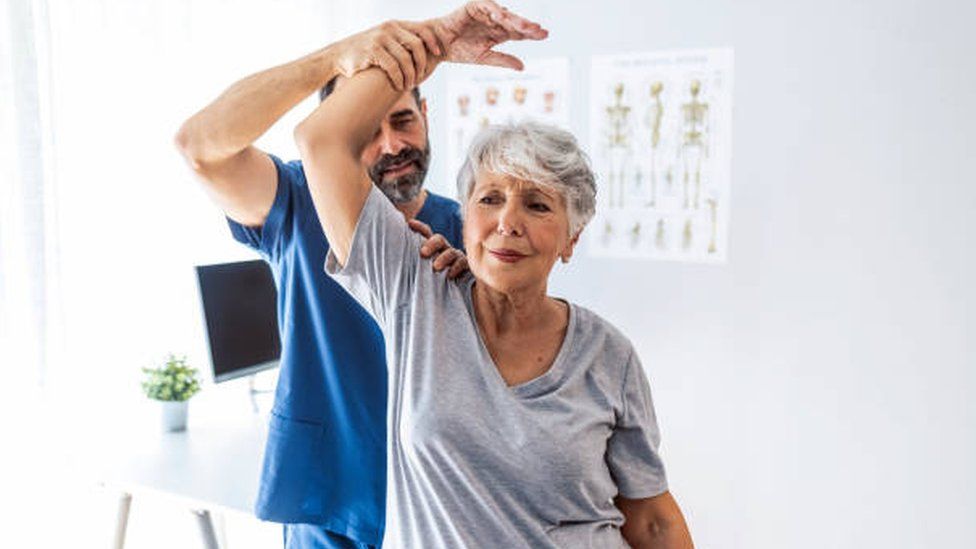ARTICLE AD BOX
 Image source, Getty Images
Image source, Getty Images
By Nick Triggle and Elena Bailey
BBC News
Thousands of NHS physiotherapists in England have become the latest group to join the ongoing industrial action over pay in the health service.
Physios and their support staff at 30 NHS services - one in seven - are staging a 24-hour walkout on Thursday.
This is the first time members of the Chartered Society of Physiotherapy (CSP) have ever gone on strike.
As with other striking health staff, physios will continue to provide care in the most urgent cases.
This includes supporting people in critical care, those with severe respiratory problems and some stroke patients who require urgent physiotherapy.
But rehab work and discharge planning and community physio is expected to be disrupted.
Claire Sullivan, CSP director of employment relations, said: "The government must come to the table with something tangible that we can put to our members to prevent more strikes following if there is no progress.
"We're determined to secure a pay deal that helps our members cope with the cost-of-living crisis, and helps the NHS recruit and retain staff to deliver the services that patients desperately need."
Ambulance staff who are members of the Unite union are also taking industrial action in Northern Ireland on Thursday.
It follows strikes by ambulance workers, nurses and other health staff across England and Wales in recent weeks over this year's pay award.
Health Secretary Steve Barclay said it was "regrettable" physios were following other health staff in taking industrial action.
He said he was now working with unions to achieve a "fair and affordable" pay award for next year.
Why physios are striking
Like the other health unions, the strike action is centred on the pay dispute. NHS physios are on the standard NHS contract that applies to all staff bar doctors and dentists.
It has seen NHS workers given an £1,400 extra this year - although some senior and specialist physios will have been given more. It works out as an average rise of 4.75%.
But all the health unions have asked for an above-inflation pay rise, arguing the past decade has seen pay fall in real terms.
They argue this is a factor in the staffing shortages being seen - one in 10 posts of all types is vacant in the NHS.
But ministers have said such rises would be unaffordable and would fuel inflation.
Starting salaries for physios are just above £27,000 in England, the same as it is for nurses. The most experienced physios can earn more than twice that in the NHS, although many combine NHS commitments with private work.
This is the first of three strikes planned by the CSP, with physios and their support staff in all seven of the Welsh health boards walking out on 7 February and physios at another 33 NHS services in England taking action on 9 February.
In all, the CSP has a mandate to take strike action in more than 120 services in England, over half of the total. This includes hospital, community and mental health teams.
The union represents three-quarters of the 30,000 physios and support staff in the NHS in England.
The unseen role physios play
Physios - along with midwives - are the third largest part of the workforce after nurses and doctors. They are, the CSP says, essential to every part of the health service.
"Physiotherapy staff are unsung heroes and deliver quiet miracles every day to help patients regain function and quality of life," Ms Sullivan added.
While the common image of them is to support patients with sports injuries and joint problems, physios are a core part of many teams in hospitals and in the community.
They work in critical care providing support to patients with breathing difficulties and building up their physical strength. During the height of the pandemic, they played an essential role in caring for Covid patients in intensive care.
They also work with patients with respiratory problems, including children with disabilities, along with providing rehab support to patients who have suffered heart attacks and strokes.
Becky Portwood, a physio in London, said she was "proud" of the work she and colleagues did during the pandemic.
"We were there in intensive care looking after patients. We are a vital part of the workforce. We are in A&E on the ground so patients don't have to stay too long in hospital - we work all across the NHS."

 2 years ago
57
2 years ago
57








 English (US) ·
English (US) ·